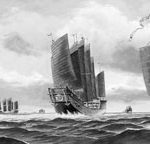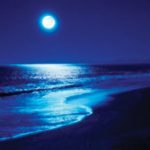Hearts at Work
A Column by Jim Tipton
Everything’s just a dear old grandpa.

So often these poets seek detachment from what they formerly found dear. Let’s look at a few passages from their poems.
Seng-Ts’an (?-606), the “Third Founding Teacher of Zen,” instructs us that: “The Great Way isn’t difficult for those who are unattached to their preferences. Let go of longing and aversion, and everything will be perfectly clear.” He concludes this particular passage thusly: “The mind of absolute trust is beyond all thought, all striving, is perfectly at peace, for in it there is no yesterday, no today, no tomorrow.”
Li Po (701-762), like so many early Chinese poets, loved the mountains, and he writes contemplatively about them: “We sit together, the mountain and me, until only the mountain remains.” (Legend, perhaps fanciful, has it that Li Po died drunk while trying to embrace the moon in the Yellow River.)
Tu Fu (712-770), perhaps the most famous of the early Chinese poets, believed so much in the power of poetry that he even prescribed his own poetry for the treatment of malaria. In this poem it is spring in the mountains and he visits the hermitage of a monk:
You want nothing, although at night
You can see the aura of gold
And silver ore all around you.
You have learned to be gentle
As the mountain deer you have tamed.
The way back forgotten, hidden
Away, I become like you,
An empty boat, floating, adrift.
Aging well, then, for these early poets include leaving the busy world behind, living in harmony with totally ordinary daily affairs, realizing as Layman P’ang (c.740-808) discovers, “Even the poorest thing shines” and “you are neither holy nor wise, just an ordinary fellow who has completed his work.” What truth we may find is inside, and as Tung-Shan (807-869) tells us, “If you look for the truth outside yourself, it gets farther and farther away.”
All of these poets seem to be asking, “What’s the use of cluttered houses, and cluttered minds? So much clutter that we can no longer experience a mountain, the moon, the scent of jasmine, our own hands.”
Shinsho (dates unknown) writes:
Does one really have to fret
About enlightenment?
No matter what road I travel,
I’m going home.
Of course those who relentlessly pursue their own way often find themselves alone in a world that no longer fits. Han Yu (768-864), one of the most famous writers of the Tang Dynasty, goes alone, “picking my way through storm clouds on the mountain, the “only life where a man can find happiness.” Back in the city, the world of others, he spends his “days bridled like a horse/With a cruel bit in his mouth” and ponders:
If only I had a few friends
Who agreed with me we’d retire
To the mountains and stay till our lives end.
When we finally pass through the “gate,” and live in the world without illusion, without longing, suddenly harmony and understanding is everywhere and as Chosha (9 c.) writes, then “just everything´s a dear old grandpa.”
I’ll end with some of my favorite lines by Wu-Men (1183-1260):
Ten thousand flowers in spring, the moon in autumn,
a cool breeze in summer, snow in winter.
If your mind isn’t clouded by unnecessary things,
this is the best season of your life.
- April 2024 – Issue - March 31, 2024
- April 2024 – Articles - March 31, 2024
- April 2024 - March 31, 2024







